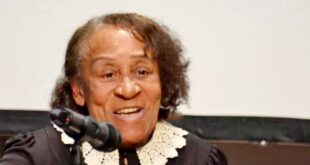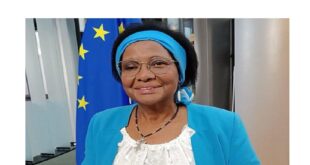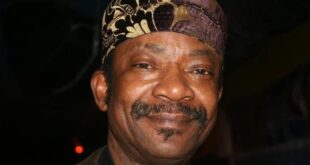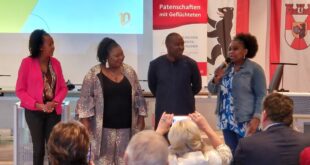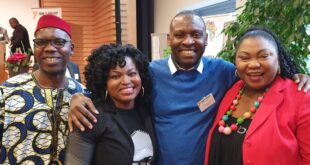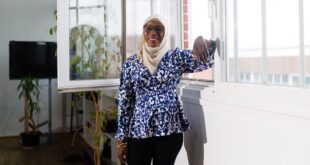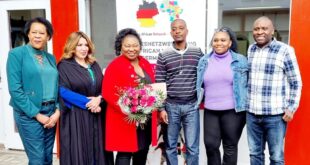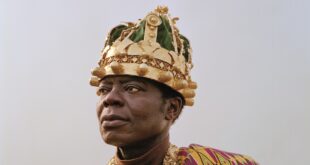Theodor Michael, the grand old man of the Black community in Germany, died at the age of 94 on 19 October 2019. Michael, who was born on 15 January 1925 as the youngest of four children to a father from Cameroon and a German mother, was one of the oldest living Germans of African descent at the time of his death.
Our contributing editor Charles Ofoji recollects his encounter with Theodor Michael at his Cologne home in September 2003. The Black German talked about how he survived the Nazi era, when “everyday was pregnant with death”, his life after the war and more..
—–
It was a warm late summer afternoon in Cologne. Nazi forced labour camp survivor, Theodor Michael, sat with this writer and Robert Ajani talking about the past, a horrible past. The slightly windy atmosphere on the balcony of Mr Michael’s modest bungalow, overlooking a Panama of lush green vegetation, provided a perfect setting for reminiscence.

On the question of how he survived the blitz of the Holocaust, the then 78-year-old man grimaced, took a long breath as if going down memory lane and sipped from a glass of orange juice. “Only God saved me, that is what I believe as an Evangelical. It is a wonder that I survived. Everyday was pregnant with death but I survived everything and all the Nazi laws. If not for God I am sure we wouldn’t be sitting here today, they could have murdered me”, he declared.
Theodor Michael’s father, Wonja, whom he talks of with great passion, was one of the two hundred Cameroonians who came to Germany towards the end of the 19th century. His own father who wanted his son to become a pastor had sent him to study theology at Oxford.
“However my father was a charmer of women and couldn’t see himself working as a pastor. He did what was expected of him. He finished his studies, but he went back to Cameroon to tell my grandfather that becoming a pastor was nothing for him. He was promptly disinherited, so my father said goodbye and sailed to Europe,” Theodor Michael recounts
Wonja Michael lived in Berlin in the pre-Nazi era, where he married a pretty native of Berlin. They were blessed with four children and Michael happens to be the last of them. His parents died before Adolf Hitler took over power. And when that happened, his brother and two sisters escaped to France but fate had it that Michael stayed behind. And what a sad fate it was. He lost contact to his siblings for over 30 years. They only re-united in the 1960s, following an intensive search, so many years after the war ended.

The Nazis prohibited Theodor Michael and other people of his colour, Gypsies and Jews from going to school. “They couldn’t accept that an African could go to school and learn a profession and I do regret that I couldn’t go to school early to study what I really wanted to,” he narrates. According to the unrecognised German hero, before the Nazis came he never had a problem growing up in Germany as a person of African descent. “Germany was a nice place and in fact an African was a train driver in Berlin. So it was not a problem for me growing up in Berlin as a kid”.
However, according to Theodor Michael, all that changed when the Nazis hijacked power. The Nazis declared him stateless and sent him, an 18-year-old boy, full of ambitions, to a forced labour camp where they made his yoke heavy and chastised him and other people of his status. “We were forced to work more than 12 hours everyday, working almost for nothing. Food was rationed to us, but it was very miserable food and often I didn’t have the appetite. I was anyway very lucky that they didn’t send me to the concentration camp.”
When Germany was liberated from the shackles of the Nazis, Theodor Michael went on to fulfil his life-long dream, which was going to the university. He studied political science at the University of Bayreuth. After his studies, he worked as Editor with the Deutsche Welle for the programme “African Bulletin”. The great-grandfather also tried acting and he performed in several theatres.
Eventually, he settled for the civil service, where he worked for over 30 years before retiring.

Michael was also a guest lecturer at the Howard University in Washington during his working days. After retiring, he went back to the theatre to continue from where he stopped. “Performing on stage is something I do enjoy and I’ve done much since my retirement from the civil service. This autumn we are going on a tour of Germany with ‘I have a dream’, which is about Martin Luther King”.
Asked if he believes Germany has changed, he says that Germany, as result of the bitter lessons they learnt during the war, is not a racist country. “Foreigners, particularly Africans have a hard time here living in a White-dominated society. If you come to a strange country, you don’t expect to be accepted with open arms. Germans are afraid of competing with foreigners, especially on the job market. But Germans per se are not racist people. They have a good heart, so long as you don’t trouble them”. “Although there are a lot of racist people here. But I enjoy living here, I am a German and I feel like a real Prussian. I can’t imagine living anywhere else”.
Theodor Michael regrets that there is no law against discrimination here to protect minorities. “It is the duty of the government to protect everybody in the country, regardless of race or descent. It is high time they enacted a law against discrimination and stopped paying lip-service to the question”. [A law against discrimination in Germany (Allgemeines Gleichbehandlungsgesetz) entered into force in August 2006]
He however advised African immigrants to fight on to stay here. “If they fail to do that, then they have failed the next generation of African immigrants who are to come here. But they must learn to do things the German way. That is the only way forward. Remember if you can’t beat them, you have to join them”.
Read the interview with Theodor Michael which was published originally in the December/January 2003/4 issue of The African Courier HERE
 THE AFRICAN COURIER. Reporting Africa and its Diaspora! The African Courier is an international magazine published in Germany to report on Africa and the Diaspora African experience. The first issue of the bimonthly magazine appeared on the newsstands on 15 February 1998. The African Courier is a communication forum for European-African political, economic and cultural exchanges, and a voice for Africa in Europe.
THE AFRICAN COURIER. Reporting Africa and its Diaspora! The African Courier is an international magazine published in Germany to report on Africa and the Diaspora African experience. The first issue of the bimonthly magazine appeared on the newsstands on 15 February 1998. The African Courier is a communication forum for European-African political, economic and cultural exchanges, and a voice for Africa in Europe.


